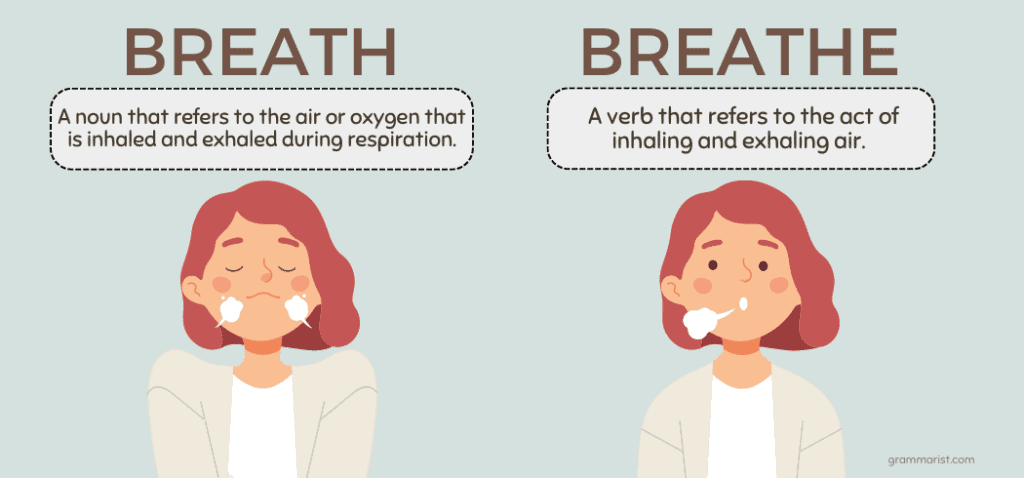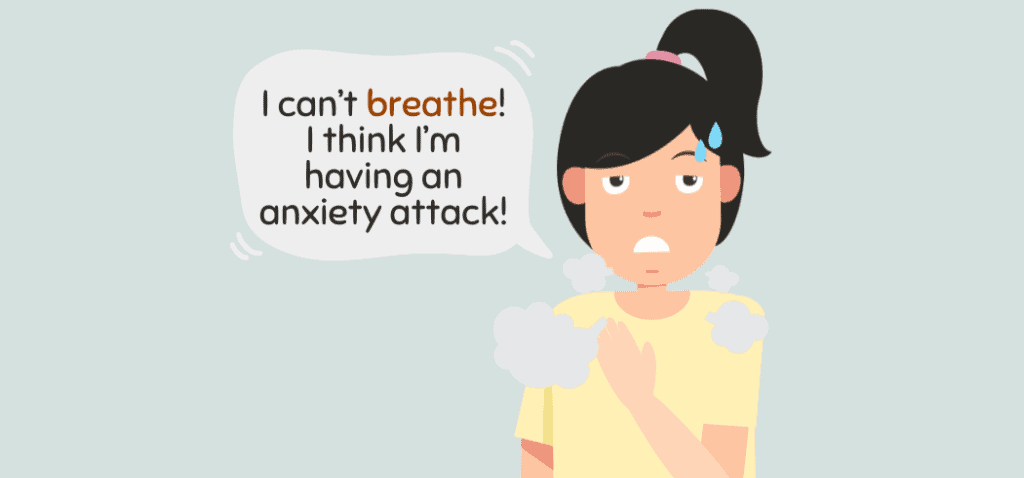Breath and breathe are two commonly confused words that are often used interchangeably but have slightly different meanings. While both words have to do with the act of inhaling and exhaling air, they are used in different contexts and should be used carefully to ensure proper usage.
Breath vs. Breathe: What’s the Difference?

The differences between breath and breathe are critical, especially when writing. Both have completely different meanings, so using one in place of the other will make your sentence incorrect.
The noun breath refers to the air or oxygen that is inhaled and exhaled during respiration. It is often used to describe the act of breathing itself or the state of being alive.
For example, statements like, “I took a deep breath to calm myself,” or “she held her breath while waiting for the answer,” easily show how to properly use the word. Breath can also be used to describe the air that surrounds us, as in “the fresh mountain air filled my lungs with every breath.”
Breathe is a verb that refers to the act of inhaling and exhaling air. It is often used to describe the physiological process of respiration, as in “I need to breathe in order to live.” Breathe can also be used more broadly to describe any act of inhaling and exhaling, such as “he breathed a sigh of relief” or “she breathed in the fragrance of the flowers.”
Are They Interchangeable?
While breath and breathe are related and have similar meanings, they are not interchangeable. Breath is a noun and should be used as the subject of a sentence, while breathe is a verb and should be used as the action being performed.
For example, “I took a deep breath” is correct, while “I took a deep breathe” is not. Similarly, “she needs to breathe” is correct, while “she needs to breath” is not. Confusing, I know. But it’ll make sense by the time we reach the end of this guide.
Breathe vs. Breath Pronunciation
It’s funny how one single letter can change everything. Breath is pronounced as bre-th, and adding the letter E at the end changes its meaning to breathe, which is pronounced as br-ee-th with a long-sounding E. Similar to how you would say words like seethe or teethe.
What Is Breathe in Past Tense?
Breathed is the basic past tense form of the verb breathe.
How Do You Use Breath and Breathe in a Sentence?

Seeing certain words within the context of a full sentence can help us better understand how to use them. Here are some common phrases using both words.
Examples of Breathe in a Sentence
- I can’t breathe! I think I’m having an anxiety attack!
- He’s been under the water too long. He can’t breathe.
- My yoga instructor told me to breathe in and out with every move I make.
- Don’t breathe in carbon dioxide.
Examples of Breath in a Sentence
- Take a deep breath before you go and confront your nasty neighbor.
- In a single breath, my husband informed me he was not only having an affair but also leaving me for the other woman.
- I love that new TV show on Netflix about functional families; it’s like a fresh breath of air.
- You have horribly bad breath, I’m sorry.
Are Breath and Breathe Homophones?
No, these two terms are certainly not homophones, but many people get confused enough to think they are.
Does Breadth Mean the Same as Breath or Breathe?
No, absolutely not. But here, we have another similarly spelled word that even sounds a lot like the two terms. But breadth actually refers to a loose unit of measure. The breadth of his shoulders, the breadth of our property is half an acre, etc.
Tip to Remember the Difference
It’s super hard, I know. One letter stands in the way of using these two words properly. The way I remember the difference between breath and breathe when writing is by remembering their sounds. Breathe sounds like breeth, which has more Es.
Breath and Breathe in Idioms
- Don’t waste your breath trying to convince me otherwise.
- I can hear you cursing under your breath.
- I just finished running seven miles! I need a chance to catch my breath!
- Do not breathe a word of what I’m about to tell you.
- My word, as I live and breathe, is that my grandson?
- You can’t breathe down my back if you expect me to get this done in such a short time.
Don’t Forget to Breathe When Writing!
It is important to use breath and breathe correctly to ensure clear and concise communication. Misusing these words can lead to confusion or make a person seem careless or unaware of proper grammar. By understanding the difference between breath and breathe and using them appropriately, one can communicate clearly and effectively in both spoken and written language.

Comments are closed.